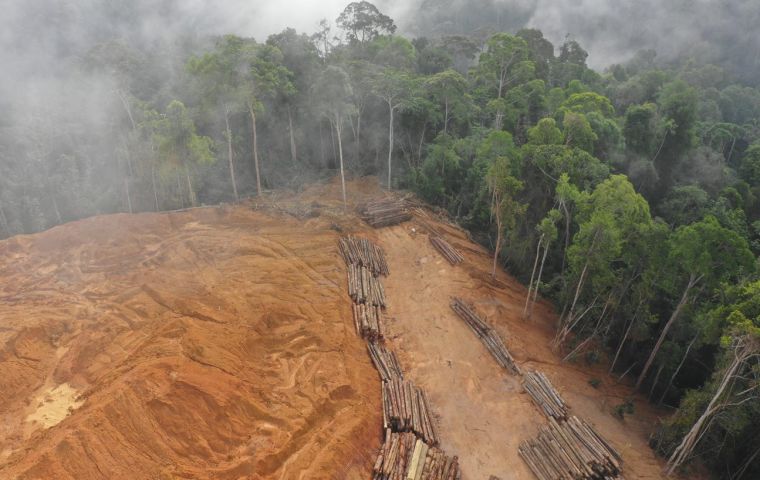MercoPress. South Atlantic News Agency
Brazil in Brussels: EU anti deforestation law will impact 34% of Brazilian exports
 Brazil in Brussels: EU anti deforestation law will impact 34% of Brazilian exports
Brazil in Brussels: EU anti deforestation law will impact 34% of Brazilian exports The government of Lula da Silva estimates that the new European Union, EU, anti-deforestation law will have a 34% impact on Brazilian exports to Europe and 15% on the country’s total exports. Folha de Sao Paulo informed the measure applies to products in the supply chains of coffee, soy, palm oil, wood, leather, beef, cocoa, and rubber.
Braziian Secretary of Foreign Trade at the Ministry of Development, Industry, Trade, and Services (MDIC), Tatiana Prazeres is in Brussels, to discuss the new law known as the “European Union Regulation for Deforestation-Free Products” and the overall agreement between Mercosur and the European bloc.
According to the MDIC, the government representative will convey the concerns of Brazilian exporters regarding the anti-deforestation law. The meetings, also include officials from the Brazilian Ministry of Foreign Affairs (Itamaraty).
The new legislation came into effect on June 29, but its full implementation will start in December 2024.
Some aspects of the law still need to be regulated, and these issues will be addressed during the discussions in Belgium. The meeting agenda also includes discussions with the European Commission’s Environment, Trade, and Agriculture directors.
Although there is a transition period, the Lula government and productive sectors viewed the measure with concern, fearing a decline in Brazilian exports to the bloc depending on the model adopted.
The European norm requires that importing companies based in the bloc implement pre-analysis (due diligence) systems to monitor supply chains to ensure that products do not come from deforested areas after December 31, 2020.
Companies will need to provide information such as geographical coordinates of the land where the product was produced, as well as data related to supply chain traceability.
In a statement, Brazil's Secretary of Secex (Foreign Trade Secretariat) states that they are working to defend the interests of Brazilian exporters. “At this moment, we want to understand how they intend to implement the measure, as many important points are still open,” she said.
“We want Brazilian data to be accepted for the purpose of meeting European requirements. Brazil has reputable and reliable tracking and monitoring systems with robust documented information,” she added.
In practice, it will be the responsibility of exporters to prove that products do not come from deforested areas. Otherwise, severe penalties are foreseen, such as the destruction of goods. To achieve this, it will be necessary to enhance tracking mechanisms across the entire production chain through satellite monitoring tools, audits, and supplier training, for example.
In September, Brazil and 16 other developing countries sent a letter to European authorities expressing “concerns” about the anti-deforestation law and requesting “effective dialogue” with producer countries.
According to Itamaraty, the statement aimed to “avoid disruptions in trade and excessive burdens on producers of agricultural goods and derivatives covered by the measure.” Brazil has reiterated its “firm commitment” to combating deforestation in negotiations.
Likewise Mercosur members have aligned with the position of Brazil and other developing countries and this could further delay negotiations for a definitive signature of the trade agreement with the EU. On the EU side France and Ireland are also questioning terms of the agreement.




Top Comments
Disclaimer & comment rulesCommenting for this story is now closed.
If you have a Facebook account, become a fan and comment on our Facebook Page!